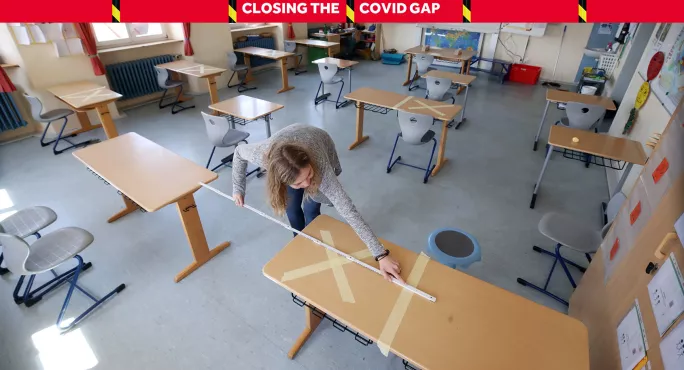School closures may have widened the attainment gap between disadvantaged pupils and their classmates by up to 75 per cent, according to research published today.
The analysis from the Education Endowment Foundation (EEF) research charity, uses existing evidence of the impact of school closures on disadvantaged pupils in circumstances such as summer holidays, adverse weather and natural disasters - as well as factors which may moderate the impact.
It says the gap could, at worst, almost double between March and September.
Exclusive: Covid-19 ‘widens achievement gap to a gulf’
Coronavirus: DfE lockdown help for poorer pupils ‘has little impact’
News: Fears about vulnerable pupils during lockdown
“A plausible bad scenario, based on this literature, would see the gap widening by 75 per cent, compared to its current size,” the foundation said. “A plausible good scenario would see the gap widening by 11 per cent.”
The study cites research from the Education Policy Institute (EPI), which estimates that disadvantaged pupils leaving primary school were around 11.5 months behind their classmates in 2009, but that this gap had narrowed to 9.2 months last year.
The EEF now says that progress has been “undone”.
The findings come as Tes begins a series of #ClosingtheCovidGap reports on the challenges faced by schools in helping vulnerable and disadvantaged pupils catch up as they come out of lockdown.
EEF chief executive Becky Francis said: “The evidence is clear that children learn less when they are not in school. Our analysis today highlights that this particularly impacts those from disadvantaged backgrounds and widens the attainment gap.
“But there are practical steps we can take to minimise the size of the gaps that are opening up - both while pupils are learning remotely, and as they begin to return to school.”
The EEF is today also launching a pilot scheme in which 1,600 disadvantaged pupils will receive “high quality” on-line tuition.
It says the scheme will be a means to assess the potential for online tuition to mitigate against the impact of school closures on the attainment gap.
Launched in partnership with charities The Sutton Trust, Impetus and Nesta, the online tuition scheme will work with pupils across the country from Years 5 to 13 in four different models.
Chief executive of Nesta, Ravi Gurumurthy, said: “There is promising evidence to show that one-to-one tutoring has a positive impact on improving learning outcomes for disadvantaged students, and could help mitigate the effects of the lockdown.
“The online tuition pilot will test how the students who need support the most can be matched with tutors, whilst ensuring the highest quality of intervention.”
The EEF says four recent evaluations of one-to-one tuition interventions had average impacts of between three and six months’ additional progress.
It says its model which trains university students and recent graduates as tutors in local schools boosted Year 6 pupils’ maths scores by an additional three months.
Education secretary Gavin Williamson said: “We know that being in school is vital for children’s education and their wellbeing, which is why we are pleased to see so many children begin to return to school this week.
“This innovative online tuition pilot is an important part of plans to put support in place to ensure young people don’t fall behind as a result of coronavirus, particularly those facing other disadvantages.
“We will continue to draw on the expertise of key partners in exploring how best to help greater numbers of pupils make up for time not spent in the classroom.”




